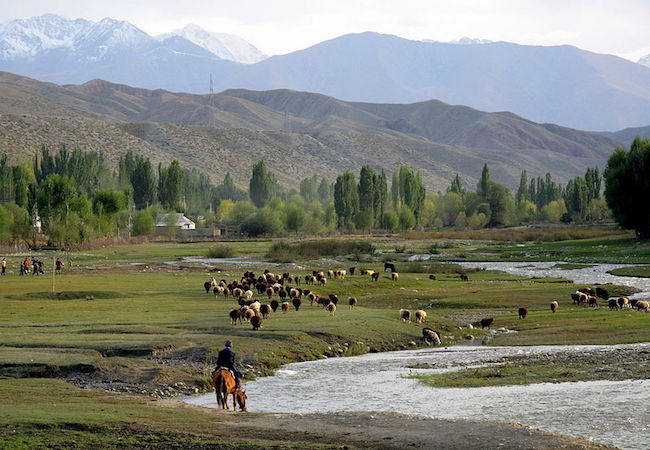
By Nauman Hassan
Naturally, the energy resources rich states of Central Asia has transformed interests of regional and global powers from the “Great Game” into the “New Great Game”. Currently, besides regional states itself, U.S, China and Russia are the most active players because of their new transformed interests whereas Pakistan and India are also deliberately active by focusing on strategic objectives like desire for alliance. Additionally, the US’ and NATOs’ eastward expansion and their presence in Afghanistan has led to an emerging bilateral strategic alignment of China and Russia. The foremost objective of this accord is to counter rebalancing strategy of US and its dominance over Asia Pacific.
Despite the democracy, Security and Energy are the core elements that are summarizing U.S strategic interests in Central Asian region. US-Iran issue over Iranian nuclear program has created a geo-strategic impasse and security dilemma in the regional spheres and is adversely affecting the geo-economic potential. In September 2007, Richard Boucher (U.S. Assistant Secretary of State); “One of our goals is to stabilize Afghanistan so it can become a conduit and hub between South and Central Asia so that energy can flow to the south so that the countries of Central Asia are no longer bottled up between the two enormous powers of China and Russia, but rather that they have outlets to the south as well as to the north and the east and the west”. Soon after Soviet Union’s dissolution in 1991, White House started reframing its policies to gain the potentials of Caspian region as U.S. was the most influential stakeholder in the region in post-Soviet era.
The disastrous incident of September 11 has compromised Russian regional standing as US and China steeped towards emerging influence and rebalancing strategy. Though Russia still enjoying dominance in the region over other stakeholders of the “Neo Great Game”. Putin’s concepts regarding developed structure of “Eurasian Bloc” and “Near Abroad” are the basic Foreign policy derivatives of Russia that targeted at regaining its lost stature. On addition, using the platform of The Collective Security Treaty Organization (CSTO), Russia played an important rule for the closer ties of Central Asian states that manifested Russian influence in the region.
Moscow pursues a two dimensional policy that focuses on geopolitical struggles in the region to counter western influence particularly the US. It remains very cautious in the matter of extra-regional powers dominance through potential alignment for defense and cooperation. Moreover, as for as the roles of Iran and Turkey, Russia has serious concerns as these are also the major stakeholders in Caspian Basin. Russia also wants to enhance its cooperation with Iran to transport energy resources. Along a side to analyze the stress in political issues and resolution, Russia is also developing its ties with Turkey bilaterally.
Being major active player in the “Neo Great Game”, China’s also growing its strategic relationship with Central Asian states. Currently, China is focusing to expand its own economy through uniting the region economically through a gateway to access European and Middle Eastern markets. Shanghai Cooperation Organization (SCO) is formed to achieve economic interests from this region and also as an indicator of Chinese objective to comprise US influence.
Chinese President Xi Jinping visited region in September 2013 targeting abundant energy reserves and construct transit routes to transport its products towards European markets. President Xi Jinping signed about US $ 48 billion investment primarily focusing energy, trade and infrastructure. Chinese trade initiative with Tajikistan surpassed Russian bilateral trade of US $ 3.7 billion. Nonetheless, the Chinese cooperation is economy based and China will not challenge Russia’s political primacy without provisions of political integration.
Indian policies are particularly focusing to become a regional hegemon. To achieve this objective, New Delhi is trying to establish good strategic relations with CARs aspires as to cement a major influence in this region. Strategically, India want to pursue positive engagement with Central Asia and Iran to develop an intra-regional transportation infrastructure and fostering bilateral economic ties despite its irrational attitude towards Islamabad. India also wants to further bolster strategic nuclear ties with Uzbekistan and Kazakhstan for import of uranium and they have signed the agreement for nuclear cooperation in 2009. Moreover, Iran is referred as a key for India’s to establish emergent relations with Central Asia and Middle East through the North–South Corridor and developing Chabahar Port. These efforts are also centered to establish a gateway for landlocked Afghanistan.
Likewise other countries, Pakistan is also viewing the Caspian region as immensely significant in strategic dynamics. Pakistan’s immediate response towards the independence of regional states was an offer to link Central Asian states with South Asia and the Arabian Sea like “Silk Route”. The unrest in Afghanistan was laying between Pakistan, and Central Asia and Pakistan’s efforts of Taliban regime was to moderate the Taliban’s attitude in order to push trans-Afghanistan gas pipelines from Turkmenistan. Beside this the Pakistan and Afghanistan could be a suitable route for Central Asian states to export energy reserves to China, Japan, South East Asia and even South Asia.




